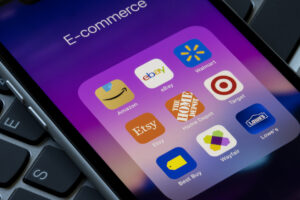The Scoop: Brands enter holding pattern amid tariff uncertainty
Also: Democrats claim Musk aims to pressure advertisers into spending more on X; NWSL signs Alex Cooper to be ‘Gen Z Whisperer.’

President Donald Trump has once again delayed the implementation of 25% tariffs on many imports from Mexico and Canada for one month.
Trump’s executive order will temporarily exclude imports from Mexico that comply with the 2020 USMCA trade pact, the Associated Press reported. The same goes for auto-related imports from Canada that comply with the trade deal.
However, roughly 62% of imports from Canada would likely still face the new tariffs because they’re not USMCA-compliant, the AP wrote, citing an anonymous White House official. The official said about half of imports from Mexico would also be taxed under the orders as well.
“Most of the tariffs go on April the second,” Trump said Thursday. “Right now, we have some temporary ones and small ones, relatively small, although it’s a lot of money having to do with Mexico and Canada.”
Why it matters: One thing businesses hate is uncertainty. And right now, that’s what we’re getting from Trump.
Trump’s tariffs, which he claims target fentanyl smuggling, have caused stock market declines and consumer alarm, partly due to rapid changes and confusion over what’s affected
Whether it’s tariffs or further delaying the TikTok ban, we don’t know what this administration is going to end up doing, deadlines or not.
Stocks dropped significantly on Thursday, with the Dow closing down about 427 points, or 1%. The broader S&P 500 fell by 1.8%, and the Nasdaq dropped by 2.6%. The market continued to decline after Trump initially failed to announce a tariff reprieve for Canada, CNN reported.
“The market is in the red during Trump’s presidency in part because of the uncertainty the administration’s trade policy has caused,” CNN wrote.
Whether these are strategic political decisions or gut reactions, it doesn’t matter to brands.
Brands should avoid speaking in absolutes or making promises, as things are likely to change. Messaging should remain clear and direct during major events, but there’s no need to react to every small change, since things are bound to shift again.
Editor’s Top Reads
- Five Democratic senators have called for an investigation into whether Elon Musk is using his DOGE holdings to pressure brands into spending more on X. This follows reports stating that X pressured Interpublic Group to increase its ad spend or risk consequences for its $13 billion merger with Omnicom Group, according to the Wall Street Journal. The report also noted that brands like Amazon, Apple and Verizon are returning to X after initially pulling back since Musk acquired the platform. While neither X nor Musk responded to the claims, the Justice Department told the Journal that it believes the issue stems from the Democrats’ anger over Musk’s work with DOGE. This isn’t the first time X’s business relationship with advertisers has led to major headlines. Earlier this year X added 18 brands, including Lego and Nestle, to an existing lawsuit over what it considers an illegal advertising boycott related to Musk’s acquisition of X back in 2022. Both using X and not using X currently carry risks with such a powerful and litigious quasi-governmental official at the head. Make sure you’re working cross-departmentally to identify the benefits across the organization. X is no longer merely a communications platform — it’s a signal and a bargaining tool.
- The National Women’s Soccer League has secured a major partnership with “Call Her Daddy” podcaster Alex Cooper’s Unwell Hydration, marking the brand’s first big sponsorship move. Cooper, dubbed the “Gen Z whisperer” by an NWSL rep, will promote the league at games and help attract young women to the fanbase. The deal, valued at just over $3 million, kicks off at the 2025 NWSL Challenge Cup with ticket promotions and a new fan club, Unwell FC. E.l.f. Cosmetics, another brand beloved by Gen Z, is also joining as a presenting sponsor for the event. “(Gen Zers) want to be part of live events… but we have to feel included and incentivized,” said Cooper, whose Instagram post announcing the deal garnered over 22,000 likes within the first 45 minutes. This is another reminder of the power of podcasts and other forms of independent media, particularly with the Gen Z audience. This demographic craves deep, meaningful connections with those targeting them, and podcasters are able to replicate that in a very intimate way given the considerable amount of time their audience spends with them. That can be really powerful when it comes to building brand loyalty or developing fans, in this case sports fans.
- Google is expanding AI-generated search with the introduction of its new Gemini 2.0 model. As part of the move, the tech giant is introducing AI Overviews to a wider range of queries, including advanced math, coding and multimodal searches. It’s also making AI-generated summaries accessible to more global users, including those who aren’t logged in. As part of this launch, Google is testing a new AI search chatbot, AI Mode, which will offer real-time responses similar to those from ChatGPT. While these advancements present opportunities for improved search results, AI Overviews will continue to present challenges. For starters, they continue to suffer from inaccuracies and hallucinations. But a potentially bigger concern for brands is that while these overviews can drive significant traffic to highlighted sites, they also present a risk that users may find the AI summaries sufficient so they don’t need to click through to the source content. To address the “zero-click search,” brands that rely on web traffic may need to find other ways to drive traffic, such as more call-to-action campaigns on social media.
Casey Weldon is a reporter for PR Daily. Follow him on LinkedIn.







